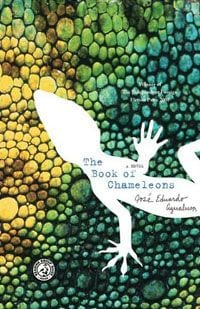
A rising international literary star, Angola-born novelist Jose Eduardo Agualusa has been compared to Jorge Luis Borges and Italo Calvino — influences, alas, all too visible in his American debut. The Book of Chameleons is a modestly intricate story, not without charm and moral seriousness, that leans too heavily on threadbare tropes and literary effects that veer perilously close to affectation.
Agualusa signals his themes — mutability of personality, duality of character, the centrality of lies to human existence — in the profession of Felix Ventura, a bighearted and lonely albino seller of used books who forges false genealogical papers on the side. These are not to provide new identities to criminal or political fugitives, but merely to burnish family histories for government officials or newly wealthy merchants.
Ventura tries to explain this difference to a mysterious white customer who appears at his door one day in search of false documents and a new Angolan identity. The man waves aside Ventura’s scruples with the promise of a $5,000 fee.
No one familiar with Borges, Calvino, or any number of international modernists, fabulists and magical realists will be surprised when the customer, now known as Jose Buchmann (“book man”; get it?), begins to insist his made-up identity is the real one. Nor will such a reader be surprised to learn the narrator is a gecko, Eulalio, who lives in Ventura’s house. Nor that he is the reincarnation of a man, able to converse with Ventura and Buchmann in dreams.
For much of this short novel, very little happens, aside from conversations, ruminations, dreams and random anecdotes. In one scene, an arrogant Angolan writer, with a new novel set in the country’s recent bloody past, is attacked with the question: “In your novels, do you lie deliberately or just out of ignorance?”
His reply is no less clichéd for being true: “I lie with joy! Literature is the only chance for a true liar to attain any sort of social acceptance.” Apparently this passage exists to highlight the truth/deception theme for readers too stupid to otherwise see it. Agualusa backloads 90 percent of the plot into the last quarter of the book. A psychologically potent consequence of Angola’s repressive recent history, it left me wishing for far less gecko — likable, to be sure — and much more Buchmann.
Though The Book of Chameleons won Britain’s Independent Foreign Fiction Prize for best novel in translation, I suspect it reads better in Portuguese, Angola’s colonial tongue, where its desultory elements might be held together by beauty of language. English readers are reduced to the torpid pleasures of wondering whether Eulalio might represent Ventura’s soul, or perhaps Buchmann’s, or whether Buchmann and Ventura are the same person, a psyche divided by tragic trauma. In the absence of adroit plotting, firm characterization or powerful language, such literary parlor games weary more than they illuminate.
One last thing: Africa has only the most superficial presence in this novel, which seems more Latin American, and not only because of the Portuguese names. In tone, subject matter, narrative strategies, this novel would be more at home in the Peru of Mario Vargas Llosa, the Colombia of Gabriel Garcia Marquez. Agualusa, a white African of Portuguese descent, is said to write in an Africanized Portuguese, but if so, this, too, has been lost in translation.

![Call for Papers: All Things Reconsidered [MUSIC] May-August 2024](https://www.popmatters.com/wp-content/uploads/2024/04/all-things-reconsidered-call-music-may-2024-720x380.jpg)



